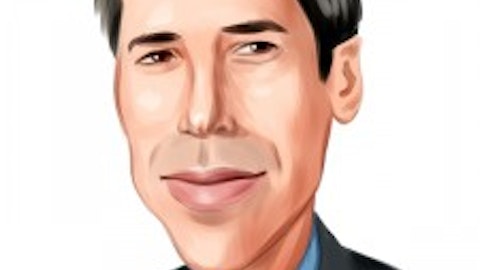Express Scripts (NASDAQ:ESRX) experienced a rough second half in 2011 stemming from the prolonged contract negotiations with Walgreens (NYSE:WAG). When 2012 rolled around, ESRX clients could no longer pick up their prescriptions from WAG. Without WAG in their network, CVS (NYSE:CVS) became ESRX’s biggest customer and CVS Caremark became their largest competitor. ESRX grew their bargaining power when they acquired Medco outright for $29 billion. This is when ESRX confirmed their preconceived notion that WAG needed ESRX more than ESRX needed WAG. YTD, ESRX has seen their stock price rise 36%, and momentum continues to build as hedge fund manager like Jim Simons and Ralph Whitworth begin to realize the competitive advantage ESRX has built.
Express Scripts reported impressive results for 2012 2Q on August 7. This was the first quarter since the Medco acquisition close last April. Adjusted EPS improved 24% to $0.88. Adjusted prescription volume was up 118% to 404 million. The spread widened between ESRX and their largest competitor, CVS, as ESRX managed 57% more prescriptions than CVS. This impressive spread between ESRX and the second largest PBM is expected to decline next year when ESRX loses UnitedHealth (UNH) business. The strong performance caused management to increase its adjusted earnings guidance for 2012 to $3.60-$3.75 per share (previous guidance: $3.36-$3.66). ESRX is not cheap with a PE ratio of 32 while CVS trades at 16x its earnings. Insiders have taken notice to the high P/E and have sold 145,120 shares since the company has picked up momentum. On June 31, 2012, the biggest insider at ESRX, George Paz, sold 129,110 shares. Paz currently hold 731,627 shares.
Perhaps the most impressive figure from ESRX is after the WAG dispute, they are expecting to retain over 95% of clients for 2013 (excluding UnitedHealth). PBM’s are also positioned to benefit from positive trends further down the road. Industry consolidation, an aging population, brand name drugs patent expirations, health-care cost-containment efforts, growth in the number of people with insurance as a result of health reform, and increasing customer acceptance of mail-order pharmacies all paint a bright future for America’s leading PBM. The PBM makes much higher margins on generic drugs, and the U.S. is in the midst of a massive wave of patent expirations on blockbuster brand-name drugs.
A growing division of the pharmacy industry is home delivery and specialty pharmacies, which comprised of 5% of total prescriptions in 2003. By 2007, that figure had doubled to 10%, and it is expected to represent 20% of total prescriptions by the end of 2012. Specialty pharmacies serve patients with chronic diseases by dispensing high cost biotechnology drugs. Specialty pharmaceuticals typically are administered by injection or infusion, and often, are administered by clinical professionals. Express Scripts saw their home delivery and specialty segment revenues increased $6.7 billion YOY, or 95.7% for the six months ended June 30, 2012. The segment has grown from 31% of the PBM’s revenues in 2010, to 36% for the six months ended June 30, 2012.
There has been a big push in America to make health costs and remedies more transparent. Express Scripts recently launched an innovative online tool to facilitate better understanding among patients of the disease affecting them and the mechanism of the resultant. Express Script’s new online offering give patients visual and audible information to help improve understanding. The tool targets patients suffering from serious diseases such as hepatitis C, hemophilia, multiple sclerosis apart from autoimmune deficiencies. According to data released by National Council on Patient Information and Education more than 60% of patients fail to reproduce correctly the information provided to them by their doctors about the drugs prescribed to them after ten minutes. Virtual coaching aims to bring down this discrepancy.

